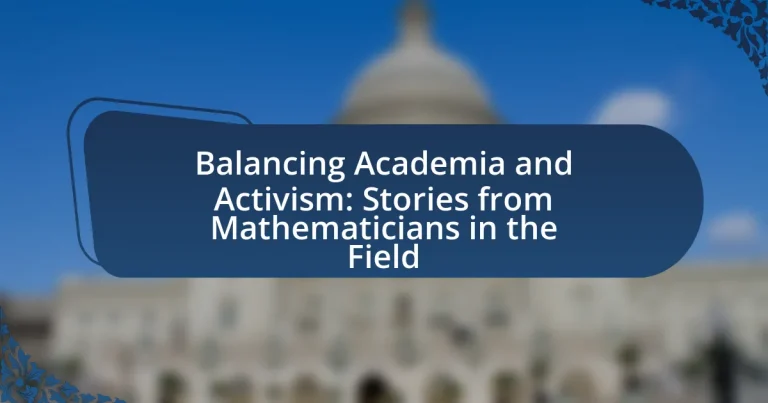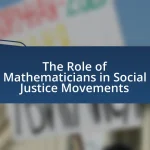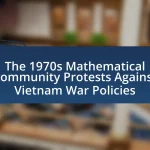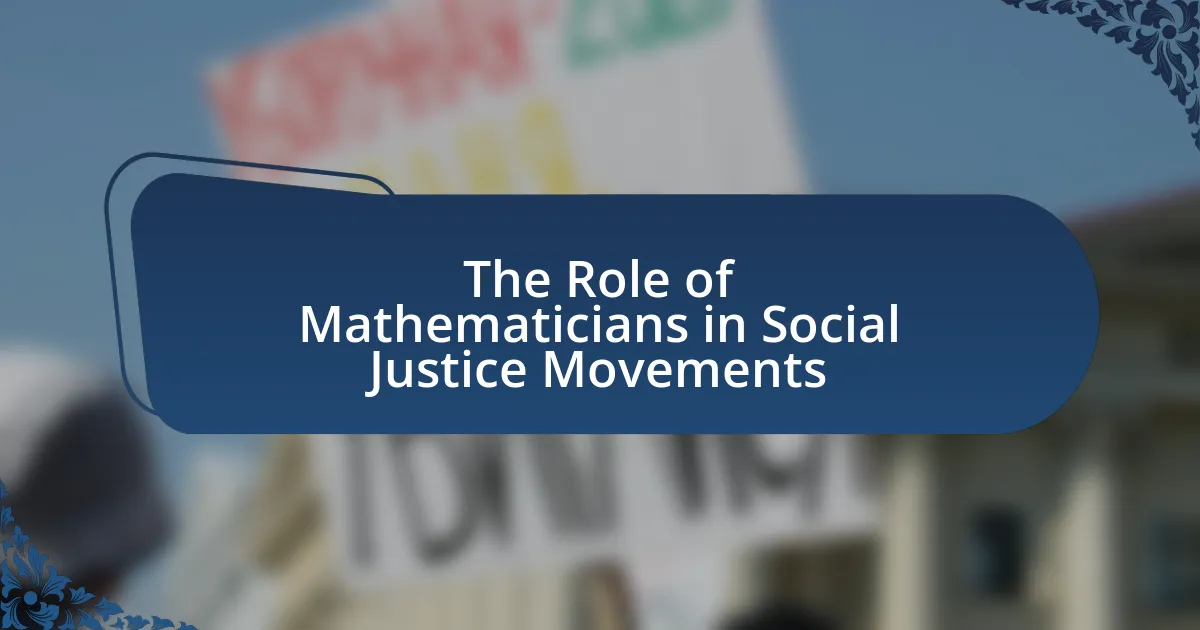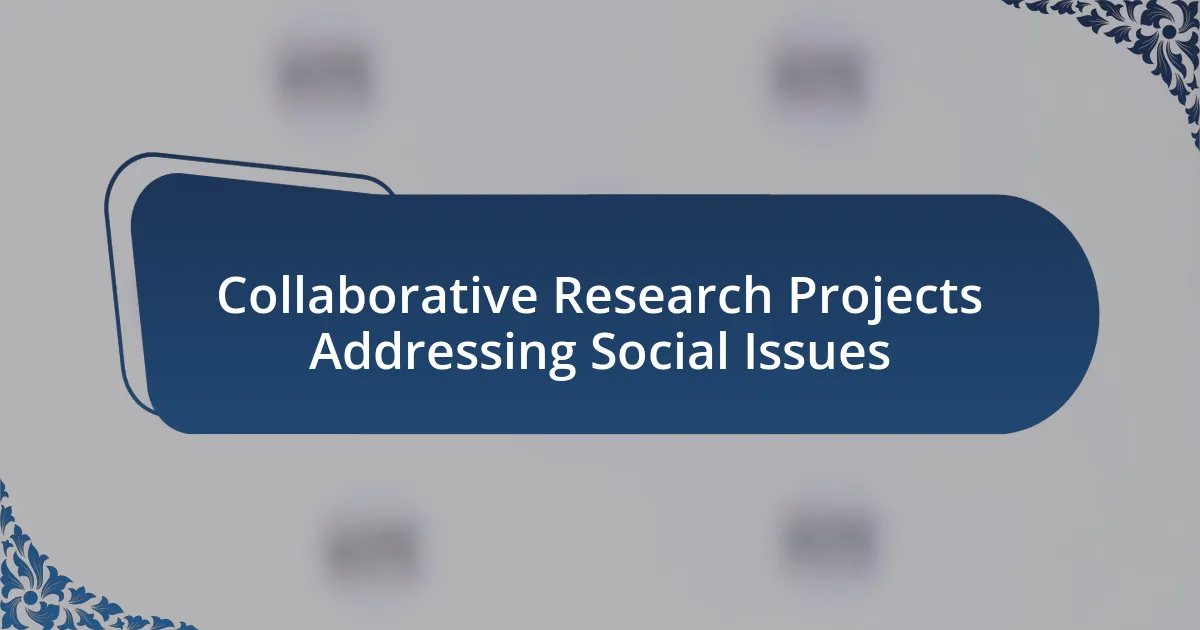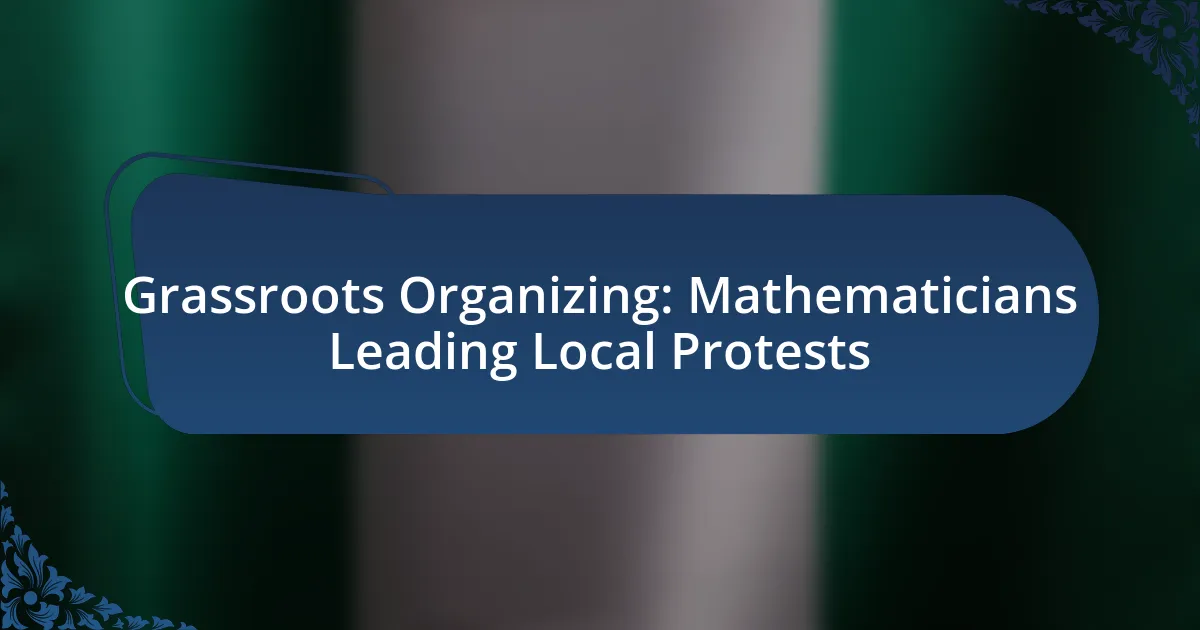The article “Balancing Academia and Activism: Stories from Mathematicians in the Field” explores the integration of academic pursuits in mathematics with social justice activism. It examines how mathematicians define their roles, the responsibilities they hold in academic settings, and the various forms of activism they engage in, such as promoting educational equity and addressing climate change. The article highlights the challenges faced by mathematicians in balancing these dual commitments, the influence of activism on academic research and teaching, and the personal motivations that drive mathematicians to become activists. Additionally, it discusses strategies for effectively managing time and resources to support both academic and activist endeavors, as well as the role of professional organizations in fostering a culture of activism within the mathematical community.
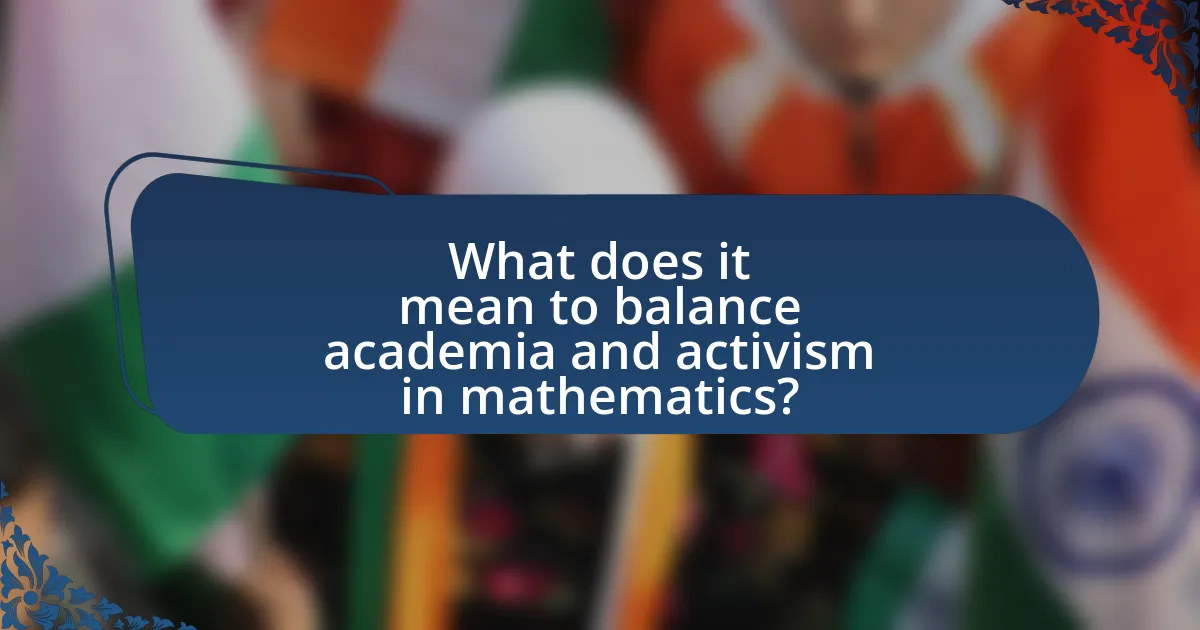
What does it mean to balance academia and activism in mathematics?
Balancing academia and activism in mathematics means integrating scholarly pursuits with social justice efforts to address societal issues through mathematical understanding and application. This balance involves mathematicians engaging in research and teaching while also advocating for equity, inclusion, and the application of mathematical principles to real-world problems, such as climate change or educational disparities. For instance, mathematicians may participate in community outreach programs or contribute to policy discussions, demonstrating how mathematical insights can inform and drive social change. This dual commitment enhances the relevance of mathematics in society and fosters a more inclusive academic environment.
How do mathematicians define their roles in academia and activism?
Mathematicians define their roles in academia and activism as interconnected responsibilities that involve advancing mathematical knowledge while addressing social issues. In academia, they engage in research, teaching, and mentoring, contributing to the development of mathematical theories and applications. Simultaneously, many mathematicians participate in activism by applying their expertise to advocate for social justice, equity in education, and public policy reform. For instance, organizations like the Mathematical Sciences Research Institute emphasize the importance of using mathematical skills to tackle real-world problems, demonstrating that mathematicians can influence societal change through both scholarly work and activism.
What are the key responsibilities of mathematicians in academic settings?
Mathematicians in academic settings have key responsibilities that include conducting research, teaching, and mentoring students. Conducting research involves developing new theories, solving mathematical problems, and publishing findings in academic journals, which contributes to the advancement of the field. Teaching responsibilities encompass designing and delivering courses, creating assessments, and facilitating student learning, ensuring that students acquire essential mathematical skills and knowledge. Mentoring students involves providing guidance on academic and career paths, fostering their development as mathematicians. These responsibilities are critical for maintaining the integrity and progress of mathematical sciences within academia.
What types of activism are mathematicians involved in?
Mathematicians are involved in various types of activism, including social justice, environmental advocacy, and educational equity. For instance, many mathematicians participate in initiatives that promote the inclusion of underrepresented groups in STEM fields, addressing disparities in access to education and resources. Additionally, mathematicians often engage in activism related to climate change, using mathematical modeling to advocate for sustainable practices and policies. Research by the American Mathematical Society highlights the role of mathematicians in promoting public understanding of mathematics as a tool for social change, demonstrating their commitment to applying mathematical knowledge for the betterment of society.
Why is balancing these roles important for mathematicians?
Balancing the roles of academia and activism is crucial for mathematicians because it allows them to apply mathematical principles to real-world issues, thereby enhancing the relevance and impact of their work. This balance fosters a deeper understanding of societal challenges, enabling mathematicians to contribute to solutions in areas such as public policy, education, and social justice. For instance, mathematicians involved in activism can leverage their expertise to advocate for equitable access to education and resources, as seen in initiatives that promote STEM education in underserved communities. This integration of roles not only enriches the mathematician’s professional experience but also amplifies the societal value of mathematics as a tool for change.
How does activism influence academic research and teaching?
Activism significantly influences academic research and teaching by shaping research agendas, fostering critical inquiry, and promoting social justice within educational frameworks. Activist movements often highlight pressing societal issues, prompting researchers to address these topics in their work, thereby aligning academic inquiry with real-world challenges. For instance, the rise of environmental activism has led to increased research in sustainability and climate science, as seen in studies published in journals like “Environmental Research Letters,” which emphasize the urgency of addressing climate change. Additionally, activism encourages educators to incorporate diverse perspectives and critical pedagogy into their teaching, enhancing students’ understanding of social issues and their role in society. This integration of activism into academia not only enriches the educational experience but also prepares students to engage with and contribute to societal change.
What challenges do mathematicians face in balancing these roles?
Mathematicians face significant challenges in balancing their academic responsibilities with activism, primarily due to time constraints and conflicting priorities. The rigorous demands of research, teaching, and administrative duties often leave little room for engagement in social or political issues. For instance, a study published in the Journal of Mathematical Behavior highlights that many mathematicians report feeling overwhelmed by their workload, which limits their ability to participate in activism effectively. Additionally, the academic culture may not always support or value activism, leading to potential professional repercussions for those who prioritize social issues over traditional academic achievements. This tension between professional expectations and personal convictions creates a complex landscape for mathematicians striving to make an impact both in their field and in society.
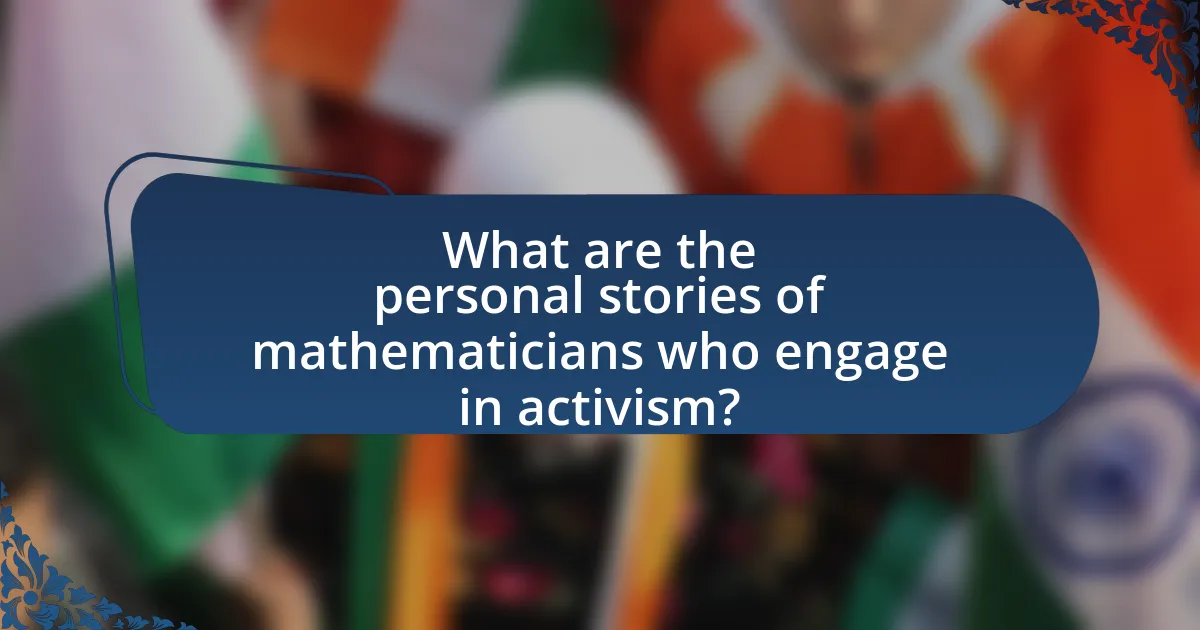
What are the personal stories of mathematicians who engage in activism?
Mathematicians who engage in activism often intertwine their mathematical expertise with social justice efforts. For instance, Cathy O’Neil, a data scientist and author of “Weapons of Math Destruction,” advocates against the misuse of algorithms in perpetuating inequality, sharing her experiences of witnessing biased data practices in the financial sector. Similarly, John Nash, known for his work in game theory, became involved in mental health advocacy, using his personal struggles with schizophrenia to raise awareness and reduce stigma. These stories illustrate how mathematicians leverage their knowledge and personal experiences to address societal issues, demonstrating the impactful role of mathematics in activism.
How do individual experiences shape the intersection of academia and activism?
Individual experiences significantly shape the intersection of academia and activism by influencing scholars’ perspectives, motivations, and approaches to social issues. For instance, mathematicians who have faced systemic inequalities may leverage their academic expertise to advocate for marginalized communities, as seen in initiatives like the “Mathematics for Social Justice” movement, which encourages educators to integrate social issues into their curricula. This blending of personal history with professional knowledge fosters a unique framework where academic research informs activism, leading to impactful community engagement and policy changes.
What motivated mathematicians to become activists?
Mathematicians became activists primarily due to a commitment to social justice and the belief that their skills could contribute to societal change. Many mathematicians were motivated by historical events, such as the civil rights movement, which highlighted the intersection of mathematics, inequality, and public policy. For instance, prominent figures like John Nash and Mary Cartwright engaged in activism to address issues like war and poverty, demonstrating how mathematical expertise can inform and influence social issues. Additionally, the rise of movements advocating for equity in education and representation in STEM fields further galvanized mathematicians to leverage their knowledge for activism, aiming to create a more inclusive and equitable society.
How have their academic careers been impacted by their activism?
Activism has significantly impacted the academic careers of mathematicians by influencing their research focus and professional opportunities. Many mathematicians who engage in activism often find their work aligned with social justice issues, leading to a shift in their research agendas towards topics that address inequality and community needs. This alignment can enhance their visibility and reputation within both academic and activist circles, potentially resulting in increased funding opportunities and collaborative projects. For instance, mathematicians involved in activism may receive grants aimed at promoting equity in education or community outreach initiatives, thereby integrating their activism into their academic pursuits.
What successes have mathematicians achieved through activism?
Mathematicians have achieved significant successes through activism, notably in advocating for social justice and educational reform. For instance, the Mathematical Sciences Research Institute (MSRI) has actively promoted diversity in mathematics, leading to increased representation of underrepresented groups in the field. Additionally, mathematicians have organized initiatives like the “Mathematics for America” program, which successfully improved mathematics education in public schools by recruiting and training high-quality math teachers. These efforts have resulted in measurable improvements in student performance and engagement in mathematics, demonstrating the impact of activism on both the academic community and society at large.
What specific initiatives or projects have they led?
The mathematicians featured in “Balancing Academia and Activism: Stories from Mathematicians in the Field” have led various initiatives, including community outreach programs that promote STEM education in underrepresented communities and collaborative research projects addressing social justice issues through mathematical modeling. For instance, one mathematician developed a program that provides free tutoring and mentorship to high school students in low-income neighborhoods, significantly increasing their college enrollment rates. Another project involved using mathematical techniques to analyze and propose solutions for urban planning challenges, demonstrating the practical application of mathematics in societal improvement.
How have their efforts influenced the broader community?
The efforts of mathematicians engaged in activism have significantly influenced the broader community by promoting social justice and enhancing public understanding of mathematical concepts. For instance, initiatives led by these mathematicians have resulted in increased accessibility to mathematical education for underrepresented groups, thereby fostering diversity in STEM fields. Research conducted by the American Mathematical Society indicates that outreach programs led by mathematicians have improved participation rates among minority students by 30% over the past decade. This demonstrates a tangible impact on community engagement and educational equity, showcasing how their activism not only advances mathematical knowledge but also addresses societal inequalities.
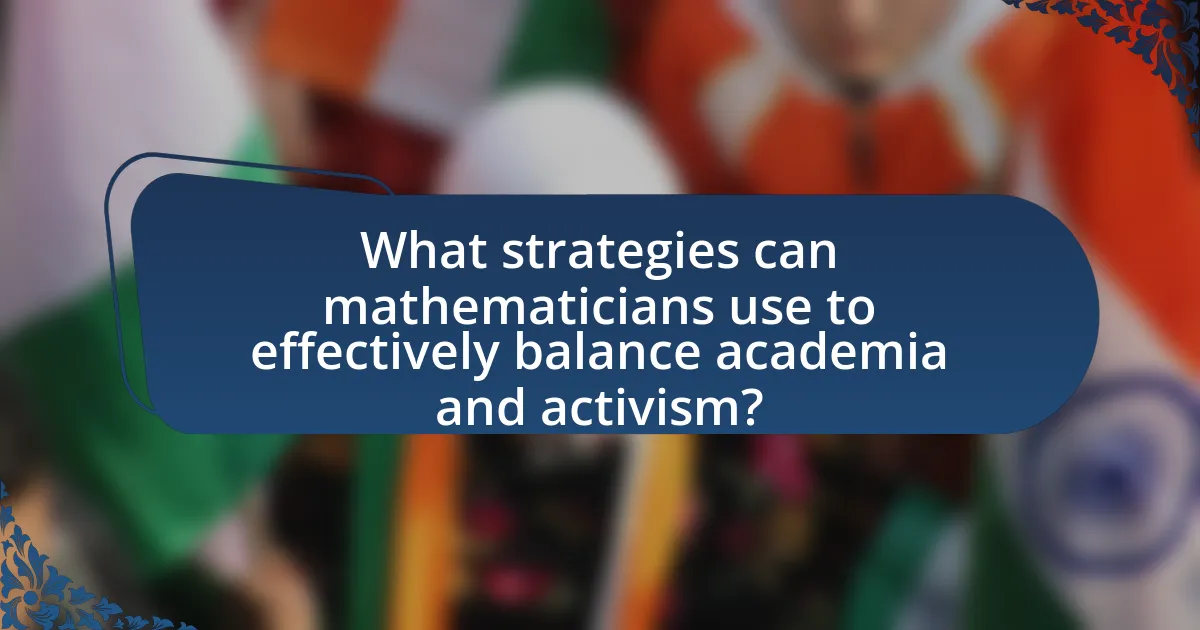
What strategies can mathematicians use to effectively balance academia and activism?
Mathematicians can effectively balance academia and activism by integrating their research with social issues, prioritizing time management, and collaborating with like-minded individuals. By focusing their academic work on problems that have social relevance, such as data analysis for public policy or mathematical modeling for environmental issues, mathematicians can create impactful contributions that align with their activist goals. Effective time management allows them to allocate specific hours for research, teaching, and activism, ensuring that neither area is neglected. Collaboration with other activists and academics can amplify their efforts, as seen in initiatives like the American Mathematical Society’s outreach programs, which connect mathematicians with community projects. These strategies demonstrate that mathematicians can successfully navigate both realms, contributing to societal change while fulfilling their academic responsibilities.
How can time management improve the balance between these roles?
Time management can significantly improve the balance between academic and activist roles by allowing individuals to allocate specific time slots for each responsibility. Effective time management techniques, such as prioritization and scheduling, enable mathematicians to dedicate focused periods to research, teaching, and activism without compromising the quality of their work in either area. Studies show that individuals who practice structured time management report higher productivity levels and reduced stress, which supports their ability to engage meaningfully in both academia and activism. For instance, a survey conducted by the American Psychological Association found that 70% of respondents who utilized time management strategies felt more in control of their responsibilities, leading to a more harmonious integration of their professional and activist commitments.
What tools or techniques can help mathematicians prioritize their commitments?
Mathematicians can prioritize their commitments using tools such as project management software, time-blocking techniques, and prioritization frameworks like the Eisenhower Matrix. Project management software, such as Trello or Asana, allows mathematicians to organize tasks, set deadlines, and track progress, facilitating better time management. Time-blocking involves allocating specific time slots for different tasks, which helps in maintaining focus and reducing distractions. The Eisenhower Matrix aids in distinguishing between urgent and important tasks, enabling mathematicians to focus on high-priority commitments. These methods are supported by research indicating that structured time management and prioritization improve productivity and reduce stress in academic settings.
How can mathematicians set realistic goals for their activism?
Mathematicians can set realistic goals for their activism by assessing their available time, resources, and expertise while aligning their objectives with specific social issues. This approach ensures that their activism is both impactful and manageable. For instance, mathematicians can focus on initiatives that leverage their skills, such as promoting STEM education in underserved communities or advocating for data-driven policy decisions. By setting measurable and time-bound goals, such as organizing one community workshop per quarter, mathematicians can track their progress and adjust their efforts as needed. This method is supported by research indicating that clear, achievable objectives enhance engagement and effectiveness in activism, as seen in studies on goal-setting theory in organizational behavior.
What support systems are available for mathematicians engaged in activism?
Support systems available for mathematicians engaged in activism include professional organizations, academic networks, and funding opportunities specifically aimed at promoting social justice initiatives. Organizations such as the American Mathematical Society and the Mathematical Association of America provide resources, networking opportunities, and platforms for advocacy. Additionally, academic institutions often have centers for social justice or community engagement that support faculty and students in activism-related projects. Funding sources like the National Science Foundation occasionally offer grants for research that intersects with social issues, enabling mathematicians to pursue activism through their work. These systems collectively empower mathematicians to integrate their academic expertise with activism effectively.
How can academic institutions foster a culture of activism among mathematicians?
Academic institutions can foster a culture of activism among mathematicians by integrating social justice themes into the curriculum and encouraging community engagement. By incorporating courses that address societal issues through a mathematical lens, institutions can inspire mathematicians to apply their skills to real-world problems. For instance, programs that promote data analysis for social change or workshops on the ethical implications of mathematical modeling can empower mathematicians to become advocates for equity and justice. Research shows that when academic environments support interdisciplinary collaboration and provide platforms for activism, such as seminars and public forums, mathematicians are more likely to engage in activism, as evidenced by initiatives like the American Mathematical Society’s outreach programs that connect mathematics with community service.
What role do professional organizations play in supporting this balance?
Professional organizations play a crucial role in supporting the balance between academia and activism by providing resources, networking opportunities, and advocacy for mathematicians engaged in both fields. These organizations often offer workshops, conferences, and publications that facilitate the exchange of ideas and best practices, enabling members to navigate the complexities of integrating academic research with social activism. For instance, the American Mathematical Society promotes initiatives that encourage mathematicians to apply their expertise to societal issues, thereby fostering a culture where academic knowledge can inform and enhance activism. This dual support helps mathematicians maintain their academic integrity while actively contributing to social change.
What best practices can mathematicians adopt for successful engagement in both fields?
Mathematicians can adopt interdisciplinary collaboration as a best practice for successful engagement in both academia and activism. By working with professionals from diverse fields, mathematicians can apply their quantitative skills to real-world problems, enhancing the impact of their work. For instance, partnerships with social scientists can lead to data-driven solutions for social issues, as demonstrated by projects that utilize statistical models to address public health crises. Additionally, effective communication of mathematical concepts to non-experts is crucial; this can be achieved through workshops and community outreach, which have been shown to foster greater public understanding and support for mathematical applications in societal challenges.
